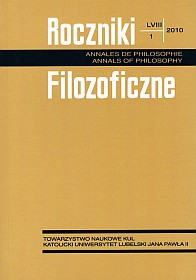On Three Elements of Thomas Reid’s Philosophy
Abstract
The aim of the article is to present and analyze three doctrines of Thomas Reid that underlay his many sided philosophy. The first one is dualism of active minds and passive bodies that Reid simply assumes as obvious. In contrast to other interpreters I think that dualism is not marginal thesis that can be omitted in Reid’s theory of perception. On the contrary, it shapes characteristic features of that theory, such as presentationalism, and direct realism. It is also responsible for the fact, that some historians of philosophy treat Reid as a proponent of occasionalism. The second doctrine is pluralistic foundationalism. It is quite different than foundationalism of Descartes since it assumes many different principles that cannot be proved. As such they have to be accepted as obviously true and obligatory in our thinking. Hume would agree with Reid that we cannot prove such principles but his conclusion would be different: that for this reason they are not true. The third doctrine I called agnosticism within theism. Reid accepts certain metaphysical theses (mind-body dualism, theory of substance as a basis for e.g. personal identity, etc.) as obvious principles, but he rejects any metaphysical speculation about their nature and relation between them. He does it on the basis of his theism that stresses limits of human cognition in relation to trustworthy God. Reid encourages scientific research that applies Newtonian empirical method (also in philosophy of mind). However, on the basis of such research we can reach only physical causes of various phenomena and present them in the form of laws of nature. From metaphysical perspective the only answer we can give is that the ultimate cause is God. Mediate metaphysical causes (between God and phenomena that are to be explained) cannot be known to us.
References
Czeżowski Tadeusz: Odczyty filozoficzne, Toruń 1958.
Daniels N.: On Having Concepts ‘By Our Constitution’, „Philosophical Monographs” 3(1976), s. 103-112.
Hamilton William: Of Presentative and Representative Knowledge, [w:] Thomas Reid, Philosophical Works, ed. by W. Hamilton, Edinburgh 1846 (18958), repr. 8 wyd. Hildesheim 1983, s. 804-815.
Hamilton William: On the Philosophy of Common Sense, or Our Primary Beliefs Considered as the Criterion of Truth, [w:] Thomas Reid, Philosophical Works, ed. by W. Hamilton, Edinburgh 1846 (18958), repr. 8 wyd. Hildesheim 1983, s. 742-803.
Hempoliński Michał: Thomasa Reida krytyka idealizmu subiektywnego z pozycji filozofii zdrowego rozsądku, [w:] T. Reid, Rozważania o władzach poznawczych człowieka, przeł. M. Hempoliński, Warszawa: PWN 1975, s. IX-XXXVIII.
Hempoliński Michał: U źródeł filozofii zdrowego rozsądku. Thomasa Reida teoria spostrzeżenia zmysłowego, Warszawa 1966.
Hume David: Traktat o naturze ludzkiej, przeł. Cz. Znamierowski, t. 1-2, Kraków 1951.
Lacoste L.M.: The Seriousness of Reid’s Sceptical Admissions, „Monist” 2(1978), s. 311-325.
Nichols R.: Thomas Reid’s Theory of Perception, Oxford: Oxford University Press 2007.
Redekop B.W.: Reid’s Influence in Britain, Germany, France, and America, [w:] The Cambridge Companion to Thomas Reid, ed. T. Cuneo, R. van Woundenberg, Cambridge: Cambridge University Press 2006, s. 313-339.
Zabieglik Stefan: Wiek doskonalenia. Z filozofii szkockiego oświecenia, Gdańsk: Wydawnictwo Zeszyty Naukowe PG 1997.
Zabieglik Stefan: Krzywe zwierciadło filozofii, czyli dzieje pojęcia zdrowego rozsądku, Warszawa: Książka i Wiedza, 1987.
Zabieglik Stefan: Historia Szkocji, Gdańsk: Wydawnictwo DJ 2000.
Zabieglik Stefan: Leksykon Szkocji – historia, polityka, nauka, kultura., Zielona Góra: Kanion 2008.
Copyright (c) 2010 Roczniki Filozoficzne

This work is licensed under a Creative Commons Attribution-NonCommercial-NoDerivatives 4.0 International License.





